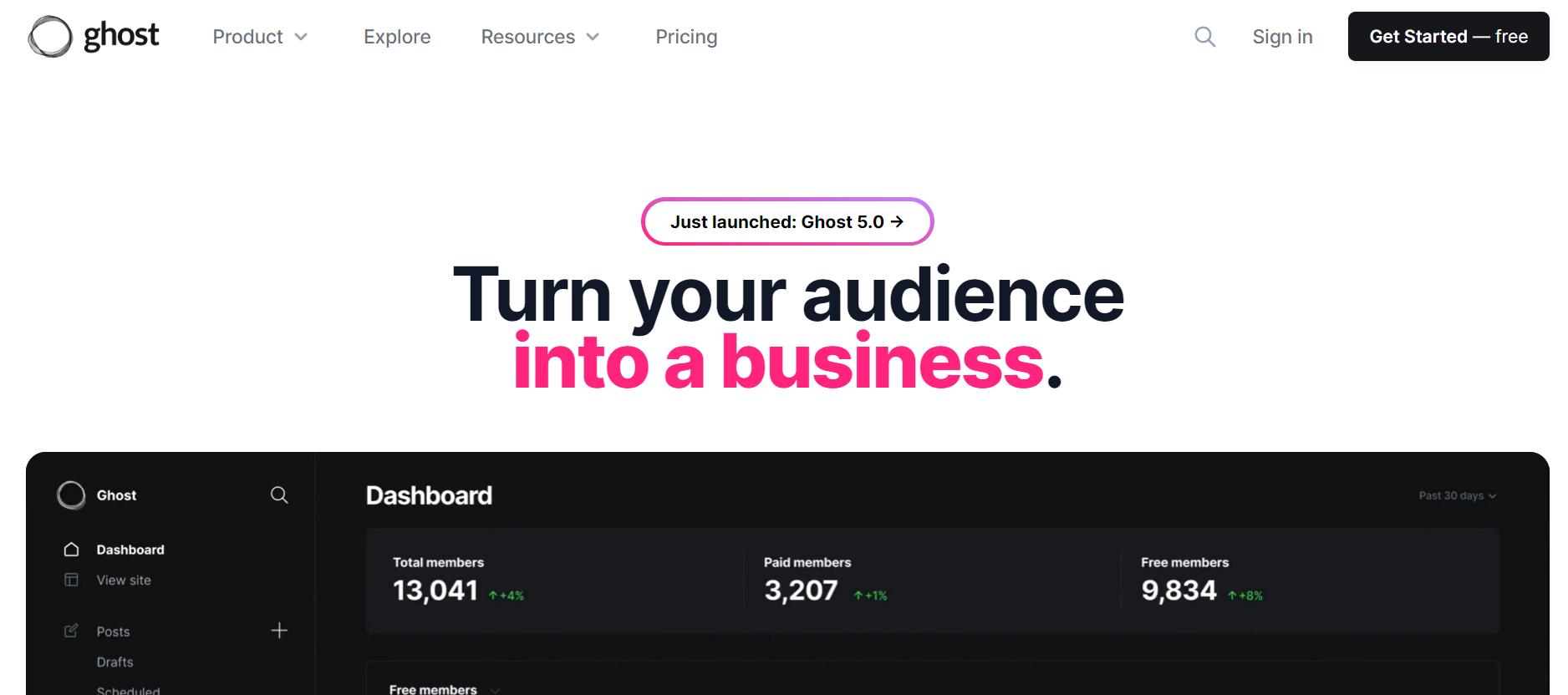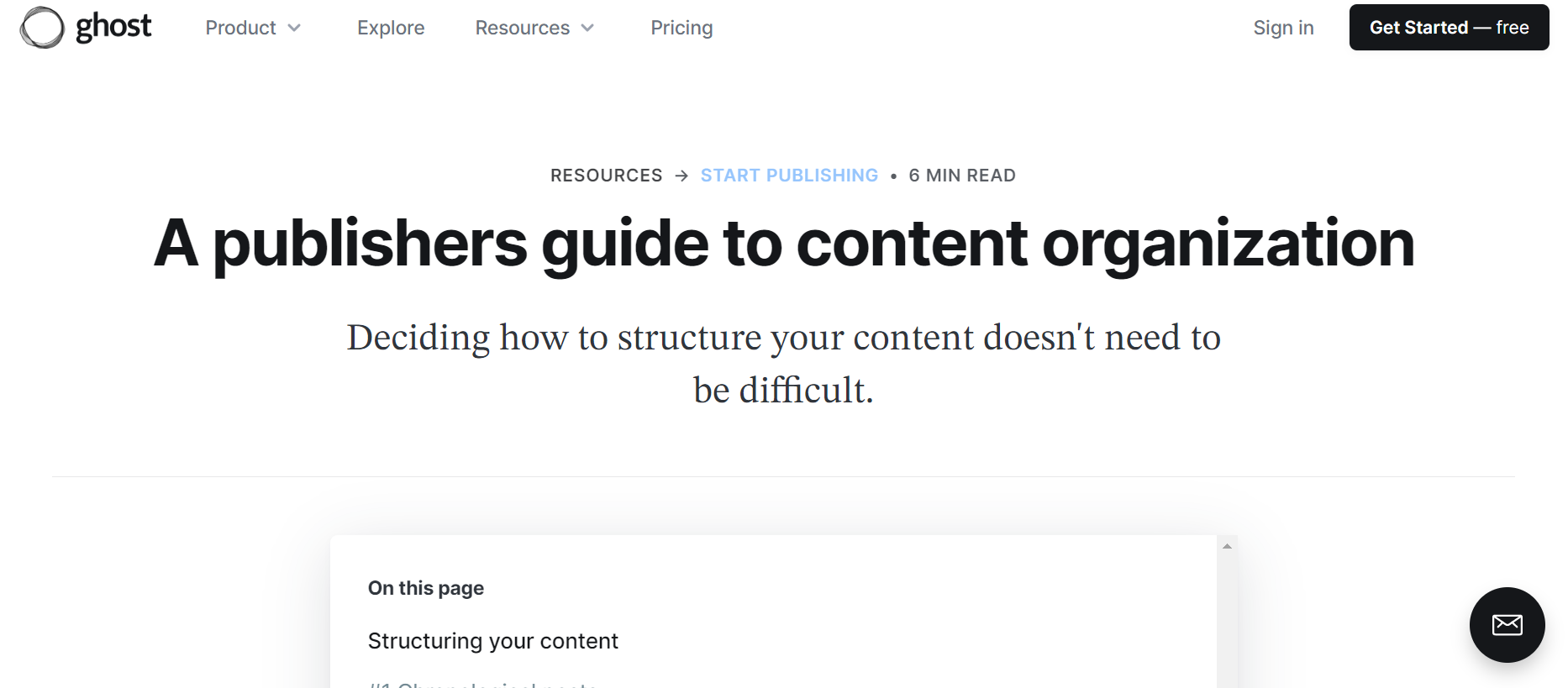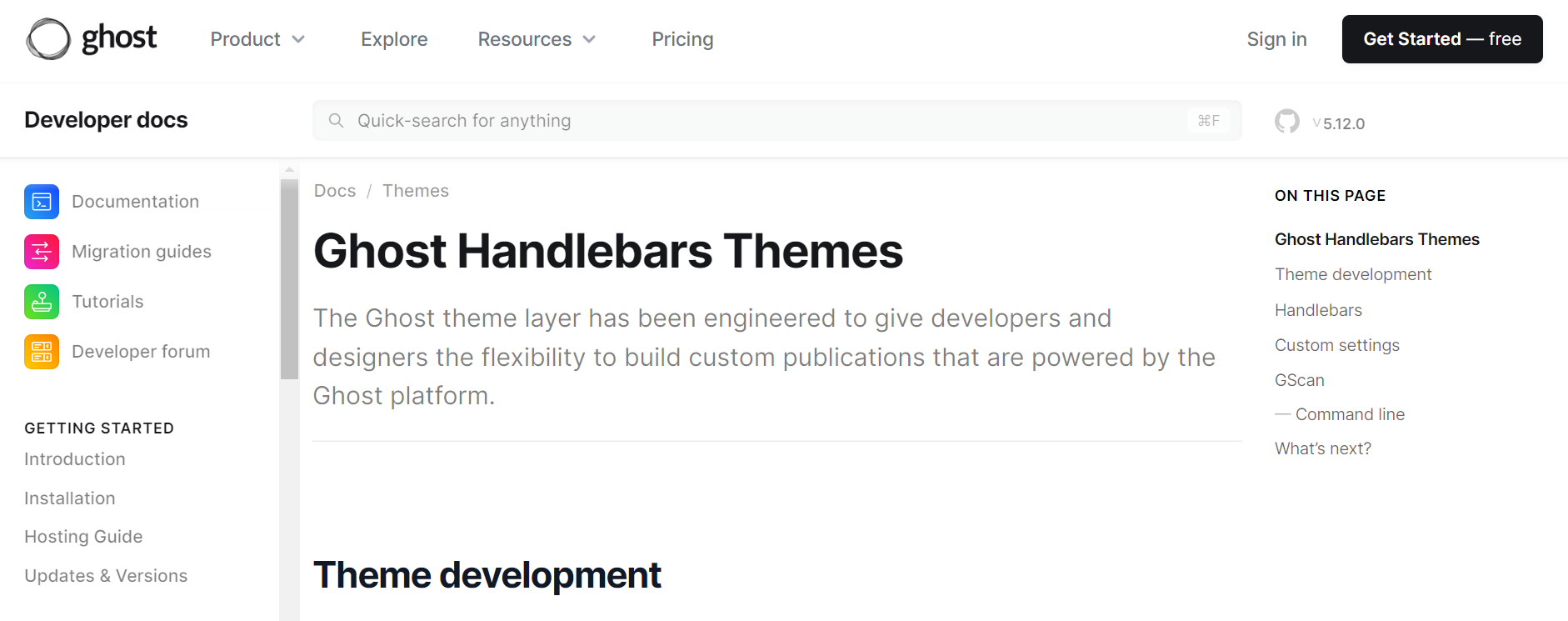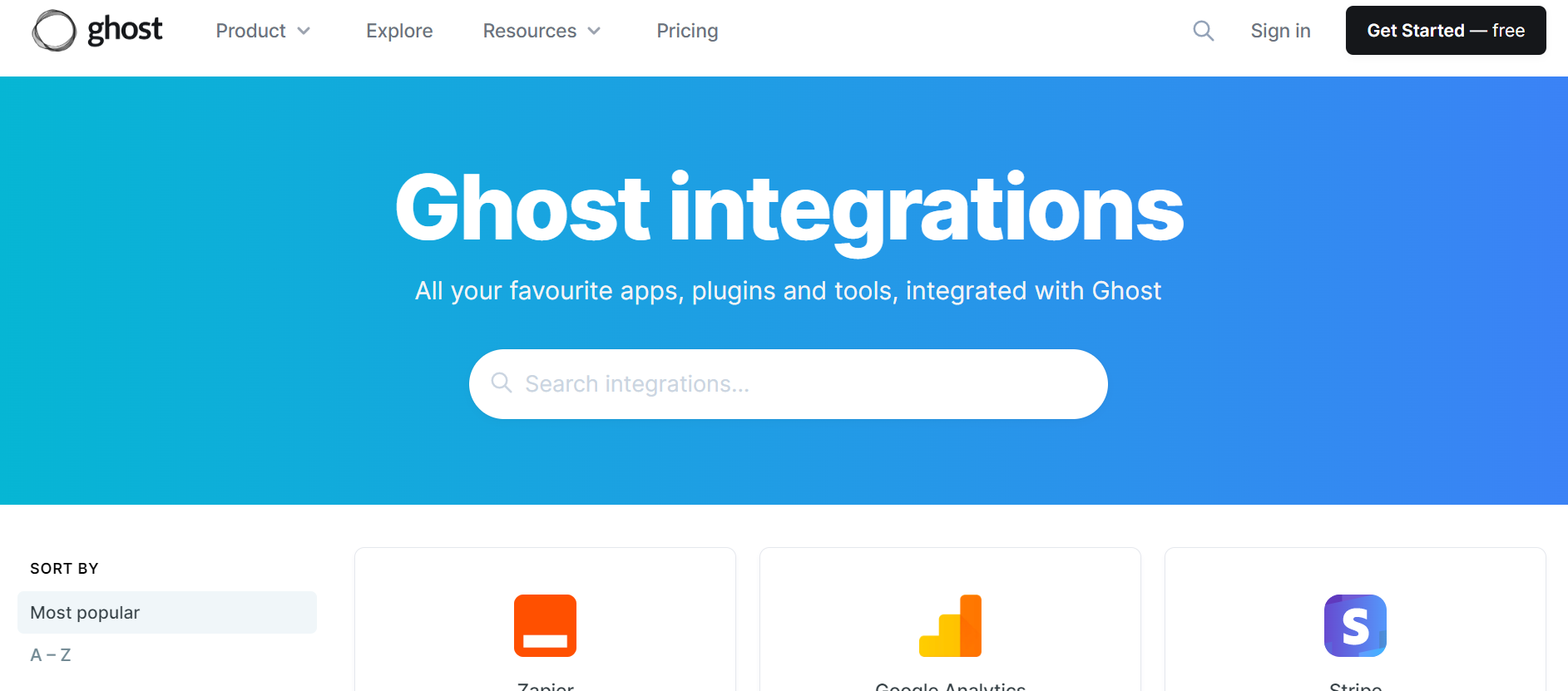Out of all of the CMS platforms available, Ghost is the most underrated. So much so to where only 0.1% of websites use Ghost to power their websites. In a way, I can understand. Competitors such as WordPress are powerful yet flexible enough for various websites.
But why should you consider Ghost? Ghost is an open-source publishing platform. Unlike many competitors, Ghost uses a Node.js technology stack. In other words, this is an open-source platform that offers more security and speed than the average CMS platform.
Do you want to learn more about Ghost? Continue reading my Ghost CMS guide.
Bottom LineUp Front
Ghost offers many benefits for content creators. It’s a development-forward CMS, perfect for customizing both the front end and back end of your blog. Like many CMS competitors, Ghost uses a visual editor to create, edit, and publish content. Ghost offers multiple payment tiers and a free option if you choose to self-host your website.
What Is Ghost?
Ghost was created in 2013 by Hannah Wolfe and John O’Nolan. Wolfe describes herself as a “polyglot developer,” and O’Nolan was a WordPress core contributor. From his experience with WordPress, he watched the platform become less focused and more complex.
These two minds collaborated to create a modern publishing platform to better target professional publishers, serving as a solution that both professionals experienced in WordPress and similar CMS platforms. Ghost was initially powered by a Kickstarted campaign, the concept becoming popular among major publishers. Today, Ghost is one of the most popular open-source publishing platforms in the world.
What does Ghost mean by open-source? Open-source is a coding term that means anyone can see, distribute, or modify the code. This doesn’t mean your content is available to the public — you still own 100% of your content. While this platform isn’t free, it is affordable. Ghost’s platform is also customizable. No licensing fees are required, so running your website comes at a low cost.
While Ghost Pro is a paid service, they do offer a free self-hosting option. To self-host your Ghost CMS, you’ll need to add Ghost to your own computer, server, or Raspberry Fi.
Ghost’s Features
Are you unsure if Ghost is right for your website or publishing company? Here are some of Ghost’s features that you should know about.
Developer-Friendly API
One of Ghost’s biggest benefits is how it’s customizable. With Ghost, developers can code their own front end and back end. Ghost uses JSON to get a website running quickly, handle traffic spikes, and also scale for website growth.
Ghost operates on a headless CMS platform. If you’re not much of a tech person, this concept may confuse you. Think of a person and separate their head from the body. The body is where you store your content, while the head is where you present your content. In a headless system, your blog only operates on the backend. This lets you have more control over content management since you don’t have the extra “head” layer to worry about.
Memberships and Subscriptions
One of the main reasons why content creators love Ghost is its ability to host membership and subscription services. This way, you can create content for your most loyal readers.
I love this feature because the memberships are built-in. You don’t need to have your fans subscribe to a third-party membership and post your content elsewhere. Your memberships can either be free or paid.
Custom Site Structure
Your Ghost CMS is built with a clean and basic website. However, you can use Ghost’s powerful customization tools to change your site structure however you see fit. For example, let’s say you want to organize your posts in a way other than the “next post” or “previous post” format. You can organize your content by type (i.e. podcast, article, etc.), topic, and more. This guide details the different content organization options.
Another way to customize your site structure is by offering content in certain regions. Let’s say your website caters to an audience in both the US and UK. You can organize your posts to fit these demographics and customize your backend to fit both audiences.
This is also useful if you offer content in two or more languages; you can separate your posts by language, so your users don’t have to use third-party translation tools. You can do this by using Ghost’s routing layer and attaching your country-based URLs or building structures for your hierarchical data.
Built-In Editor
Ghost has a visual editor, meaning it’s very similar to the Gutenberg (also called block) editor. They offer typical formatting options (italicizing and bolding sections, etc.) and more ways to add dynamic content. With Ghost, you can add galleries, videos, and other embeds to your post. You can also do your own coding to further customize your content.
If you are experienced with the Gutenberg editor before, you can navigate Ghost’s editing backend. Click the paragraph and start typing. A “hood” appears over the section you’re writing to customize your text. You can also click the + sign to add media.
Unlike “blocks,” Ghost calls these sections “cards.” There are numerous cards you can use, but I find the call-to-action cards the most useful. Since one of Ghost’s main features is its built-in membership model, you can invite users to subscribe to your newsletters directly from your blog.
For the CTA card, you can choose a format between dividers, buttons, or simple text. No code is necessary for this card — if you want to include a button, you can link your button to the sign-up page URL.
Before publishing your post, you have the option to preview it first and schedule your post’s publication.
Custom Themes
Ghost uses a Handlebars.js front-end theme editor. In other words, this editor uses templates in the Javascript function, so you can apply and activate your theme faster than the competition allows. If you want to customize your template, editing in Handlebars.js is very straightforward. Ghost details how to build your own Handlebars theme here.
Does all of this sound confusing? Don’t worry, you don’t need coding knowledge to produce a beautiful website on Ghost. Ghost offers a Theme Marketplace filled with pre-made website templates. If you decide not to use an editor, the default theme uses a clean design that’s popular among magazine and news websites.
Multi-Member Team
Will your whole team be using Ghost? You can set up various roles and permissions for each team member. Here are the roles that Ghost offers:
- Owner: Self-explanatory, this role has access to everything including billing details. This role can’t be deleted.
- Administrator: Also has access to all data, but can be deleted.
- Editor: Can manage, invite, and edit the work of other authors and contributors.
- Author: Can publish and create new posts.
- Contributor: Can log in and write posts, but they can’t publish their own content.
Apps and Integrations
Because Ghost is open-source, it can integrate with nearly any app. However, not all apps offer seamless integrations. Some apps require writing Markup or Javascript to integrate into your Ghost CMS. If you want to make the process easier for you (especially if you have no technical expertise), Ghost offers a directory of integrations with instructions.
SEO
If optimizing your content for SEO is a major priority for you, Ghost offers technical capabilities to get your blogs noticed in search engine results. For example, Ghost automatically generates and links every page to a complete Google sitemap.
This is integral, so Google bots can crawl your page. There’s no need to use third-party apps, services, or plugins. Other technical SEO solutions that Ghost offers include auto-generated canonical tags and structured data, so your SEO remains intact.
While Ghost does most of the technical SEO for you, you should still handle your own on-page SEO. This includes conducting your own keyword research and adding that keyword to the title and first paragraph as well as internal and external linking in your blog.
Who Should Use Ghost
Technically, all content creators can use Ghost. But with so many CMS options out there, you may wonder if Ghost is right for your needs. Here’s when you will benefit from Ghost, depending on who you are as a content creator.
Independent Writers
I tried Ghost as an independent writer. It’s convenient enough for bloggers and solo content creators, especially if you run a membership.
But I found their service to be a little too technical for me. If you need a CMS that offers more customization on a development front, I suggest trying Ghost. This is also a good option for writers who want to grow and scale their businesses, especially for memberships.
Marketing Teams
Because Ghost can support multiple roles, this is a good option for multi-member and complex marketing teams. Their Team plan is $50/month and can support up to five team members.
Because Ghost’s backend can be accessed anywhere, this is a great option for remote teams. Ghost offers serious newsletter, lead generation, and technical SEO capabilities, so this CMS is perfect for marketing teams prioritizing these needs.
Businesses
For businesses that need more in their content management and marketing, Ghost offers a business plan with unlimited staff accounts. In addition, they sell premium managed hosting to continue growing your content business.
This is the best solution for publishing companies, specifically ones that sell newsletters to 10,000 members and need unlimited staff members.
FAQs
Question: How do I get started with Ghost CMS?
Answer: Go to their pricing page and decide which plan you want. Click the “Get Started” button. You can try Ghost for free before committing to a paid plan.
Question: Should I use WordPress instead?
Answer: I chose WordPress over Ghost. I honestly think WordPress is better for content creators who don’t need as many technically customizable functions.
Plus, WordPress has some of the same benefits as Ghost. WordPress is also an open-source platform and can be used as a headless CMS. However, Ghost does have some benefits over WordPress; for example, since it uses a Node.js stack, it’s faster than WordPress.
Question: Will my Ghost website be self-hosted?
Answer: It does come with a self-hosting option.
Question: Is Ghost free?
Answer: If you self-host your Ghost CMS, it’s free. But this means you must host your Ghost CMS on your own computer, server, or Raspberry Fi. However, Ghost doesn’t offer self-hosting customer support. This means that self-hosting your Ghost CMS is best handled by those with technical expertise.
Question: I don’t want to pay for my CMS nor do I want to go through the trouble of self-hosting. What are my options?
Answer: WordPress offers a free service (though you can’t use your own domain name). Here are other CMS platforms that offer a free domain:
- Weebly
- Wix
- Substack
- Postach.io
- Joomla
Question: I want to make a living off blogging. What type of blog should I run?
Answer: Here are the types of blogs that generate the most income:
- DIY
- Lifestyle
- Pet
Even though those niches are the most profitable, any type of blog can generate passive income. But your blog should have these qualities to be successful:
- Unique perspective
- Selling proposition (will discuss this more in the next question)
- Valuable content
- Affiliate marketing
- Google Adsense
Question: I already offer a paid membership to my blog. What are other ways that I can get paid by blogging?
Answer: Affiliate marketing is a great way to get paid by creating content. All you have to do is promote another brand’s products or services and include a discount code. Buyers will use your discount code during their purchase, so you get a commission from that sale. Selling advertising and making merchandise is also a good way to generate a profit.
Bottom Line
Ghost is quickly becoming one of the most popular CMS platforms.
This platform has its pros and cons; I personally think it’s tailored more to developers and content creators who want a more customizable experience.
At the same time, Ghost is an alternative to WordPress and other major open-source CMS platforms. Even if you don’t use the developer tools, Ghost has a clean back end, and it’s easy to create and upload content. You can either code your own theme or use one of Ghost’s pre-made themes. I suggest choosing Ghost if you rely on income from content memberships, subscriptions, and newsletters.
Before signing up for Ghost, I suggest researching this CMS more to ensure it’s right for your blog or publishing company.
Read More:
- How to Cancel Grammarly & Get a Refund - April 20, 2023
- Best Affiliate Networks Guide: Finding a Quality Partner for Your Blog - October 20, 2022
- Webflow CMS Guide: Is This Platform Right for You? - October 20, 2022









